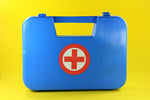
Take The Time To Learn CPR. Save A Life.
, by Dr. Jeff Pearl, MD, 3 min reading time

, by Dr. Jeff Pearl, MD, 3 min reading time

I was out for a long bike ride last Sunday when about 9 miles in, I came across a middle-age man in cardiac arrest. He was riding alone, coming up a somewhat steep grade and fell over in cardiac arrest—still clipped in his pedals. Two other bikers found him, likely within a minute of the event and started CPR. I arrived on the scene and helped them get him out of the bushes and on to a flat hard surface. I took over the chest compressions. Another biker had already called 911. When the paramedics arrived he was in ventricular fibrillation and they quickly defibrillated him with a shock. Within a minute of that he had a pulse, blood pressure and even started breathing on his own and was taken to the hospital. The whole thing lasted about 10 or 15 minutes, but had he not been found and CPR started within the first couple of minutes, he likely would not have survived. I later found out that he underwent placement of a coronary stent later that day for a coronary occlusion and was not only alive, but awake. As a physician, this was not an unfamiliar scenario or even experience for me, at least in a hospital setting. But for a non-medical person, it can be quite scary and even incapacitating in terms of what to do. Fortunately, the first two bikers that found this man started CPR quickly. Those first two minutes, before I took over compressions, were absolutely critical in this man’s recovery and vital to him waking up neurologically okay. They did not hesitate but acted. I assume they had CPR training, but perhaps they had only seen it on television and imitated what they knew. Either way it worked.
Many of us make the statement—“I should learn CPR”, but too often we do not follow through with training. The fact is that 25% of acute coronary events result in a potentially fatal arrhythmia called ventricular fibrillation. This is often the first sign of any heart problem. If not resuscitated promptly, people die from ventricular fibrillation. On the other hand, if they are defibrillated quickly their chance of survival is very good. While CPR, which is basically effective chest compressions, does not reverse the heart rhythm, it does support the blood flow to the heart, brain and body until a shock can be applied. With the widespread availability of devices called AEDs in airports, schools, malls and many large offices, rapid defibrillation can be done by anyone. Furthermore, paramedic response times are very good and they can also rapidly defibrillate a person. Remember to call 911 at the first sign that someone is in cardiac arrest. But don’t wait to start CPR. Without CPR, a person in ventricular fibrillation literally has minutes before they are no longer able to be resuscitated. Even if they are defibrillated , it is possible to have irreversible brain injury from the lack of blood flow. Every minute counts and those minutes can and will be prolonged with effective CPR. The bottom line is to get CPR training, start it promptly if indicated, and call 911. It may just save a life…and that life might even be yours.


![PRōZE Review [2020 Update]](http://hihealth.com/cdn/shop/articles/cbd_insider_article_graphic_featured_image-11.jpg?v=1591495027)